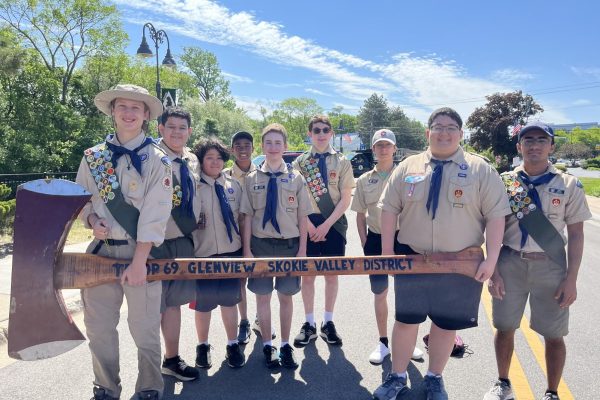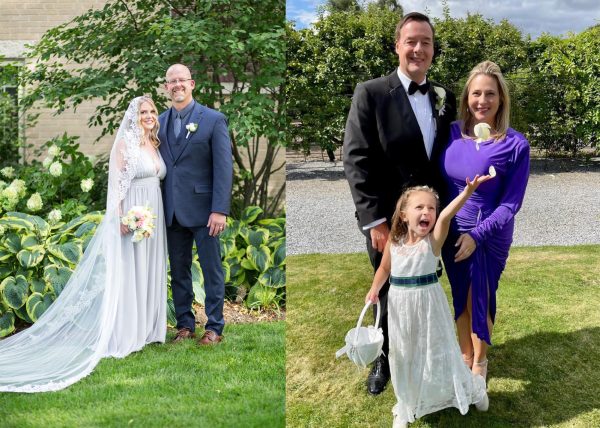Silence broken: Harris successfully regains hearing
March 13, 2015
Life for Terry Harris, special education teacher and baseball coach, was turned upside down this past fall. After struggling with hearing difficulties for his whole life, Harris unexpectedly lost all his hearing on Oct. 25, 2014.
According to Harris, his original hearing impairment was first noticed by his family after he went missing in his neighborhood when he was four. Until this moment, Harris and his family were unaware of his total deafness in his left ear and partial deafness in his right ear.
“My parents discovered [my hearing loss] when I went missing in the neighborhood and they couldn’t find me,” Harris said. “They were yelling and screaming, and then one of them walked behind me. […] They got right behind me and I still wasn’t able to hear them, so that’s when they took me in, and I got diagnosed with[…] profound hearing loss.”
Upon his diagnosis, Harris was given a hearing aid for his right ear and was admitted into an oral program for students with hearing loss at Berrien County School District. According to Harris, an oral program teaches students to read lips, body language and assess the environment in order to adapt to mainstream society. Even though Harris learned the skills necessary to function normally in everyday situations, he still faced challenges with group conversations.
“Social situations were tough,” Harris said. “If you’re in a group of friends and they’re all laughing, you’re trying to figure out what they’re laughing about. And when you’re the only one not laughing, how do you handle that?”
Despite these struggles, Harris found his talent through athletics. He became the starting varsity quarterback for all four years of high school and feels that his skills on the field allowed him to be seen as equal to his peers, Harris said.
“I was very athletic,[…] so I allowed that to put me on the same level as my peers,” Harris said. “They accepted me because of my athletic ability, so because of that, they were able to look at me as who I was, rather than what my disability was.”
Harris continued his athletic career after high school, playing football, baseball and basketball at Elmhurst College. He began to work as a special education teacher and had little trouble functioning in day-to-day life. Julie Feeney, special education teacher, believes that Harris is a great teacher and is very invested in his job.
“[Harris] loves his job, and especially loves interacting with the students, in both the teaching and coaching realms,” Feeney said. “He is passionate about being a teacher and is always looking for ways to make himself a better educator.”
Like Feeney, senior Ben Samborn, South baseball player, can attest to Harris’s dedication as a coach. He believes Harris places more emphasis on the players rather than the outcome of the game.
“As a coach, [Harris] didn’t ever really care about winning or losing, because he knew as a sophomore coach that wasn’t really his job,” Samborn said. “He was more concerned with how we played. His main goal was getting us ready to play at the varsity level.”
Harris used his oral skills developed over the years to be an effective coach and teacher. However, on Oct. 25, 2014, things took a turn for the worse, and Harris found himself completely deaf.
“For the last year, my hearing was kind of fluctuating,” Harris said. “It would come and go at certain levels, to the point where it was kind of like I had a head cold or a sinus infection. [Oct. 25] was a Saturday afternoon. I was walking into the living room with my kids and wife to go to the park, and right then I got hit with vertigo. […] For me, as soon as I got hit with the vertigo, my hearing was gone.”
Harris and his wife immediately called his doctor, and they were told to go to the emergency room. After taking medicine to stop the vertigo and getting his ears checked out, Harris was told he would need to see an Ears, Nose and Throat (ENT) doctor as soon as possible.
“The doctor took one look at my ears and said, ‘you have to go see an ENT on Monday,’” Harris said. “Basically, it was pretty scary. I knew in the back of my mind that at some point [I could lose my hearing], but I never knew how to handle that.”
This news also came as a shock for Harris’s wife, Karin Harris who, like Terry, suspected that he may lose his hearing eventually, but never this early in his life.
“I guess I always took Terry’s hearing for granted, or at least more so than I should have,” Karin said. “I knew[…] that he could lose more of his hearing, but I never thought it would be completely lost, at least not until he was old and gray.”
The ENT confirmed Terry’s deafness, and after participating in a qualification process, Terry was told he could receive a cochlear implant in his right ear. A cochlear implant is an electronic device that partially restores hearing in people who have severe hearing loss due to damage of the inner ear and who don’t benefit from hearing aids.
According to Terry, if the technology existed when he was born, he would have qualified for a cochlear implant at birth. He scheduled his surgery for Jan. 5, and until then, continued work for a month. Though he was still capable of teaching and interacting with his students, Terry eventually felt he couldn’t provide fully for his students and decided to leave work until after the surgery.
“[While teaching without hearing], it was very easy for me to communicate with my kids, but some lips are harder to read than others,” Terry said. “I had some adults in the room who were working with students and they were able to help. I was able to work just fine, but it was just that my students were not getting 100 percent of me, so I had to take that time off to go get [my hearing] fixed, and so it was a tough month, a very exhausting month.”
Upon leaving work, Terry stayed at home to take care of his children and wait for his approaching surgery. According to Terry, the most difficult part about these months was the feeling of being secluded from those around him.
“The hardest part of living these three months before getting my cochlear implant [was] being isolated, living in silence,” Terry said. “Trying to explain that to people is hard; it’s an odd concept. You can’t really put yourself in that situation without actually being in that situation. […] It was tough.”
During these months of silence, Terry was inspired by his students to start a blog to keep everyone informed on his progress. According to Terry, his blog was useful for informing his students, family and friends, as well as offering a therapeutic outlet for him to process his emotions.
“I’ve never really been a writer, but it was honestly the best thing that I could’ve done, for a lot of reasons,” Terry said. “If it weren’t for other people writing blogs about their cochlear [implants] and their hearing processes, I would not have been as comfortable or as aware of it as I am now.”
Feeney read Terry’s blog to stay updated while he was out of work. Feeney said that she thought his blog was very informative to those unfamiliar with the surgery and procedure that Terry was going through.
“I found [Terry’s blog] to be heartfelt and insightful,” Feeney said. “I think it really gave a real look into what he was going through, especially since not many of us know people who have been through the [cochlear implant] procedure.”
After getting his surgery to install the cochlear implant, Terry had to wait another two weeks before getting the implant activated. After months of silence, Terry was nervous and anxious to get his implant turned on because doctors are unable to predict how successful the implant will be once installed. However, Terry’s activation day went better than expected, he said.
“[The doctors] turned [my implant] on, and I was able to hear my audiologist speak,” Terry said. “The fact that I could hear voices was a huge relief, and I was fighting the emotions. I had tears of relief, tears of happiness. I don’t think there was a dry eye in the room.”
Terry is currently in recovery from his procedure; he is working on managing his cochlear implant and training his brain to cooperate with the new technology to further improve his hearing. He hopes to return to work in the spring. To learn more about Terry’s journey and progress, go to www.terryshearingjourney.wordpress.com.










